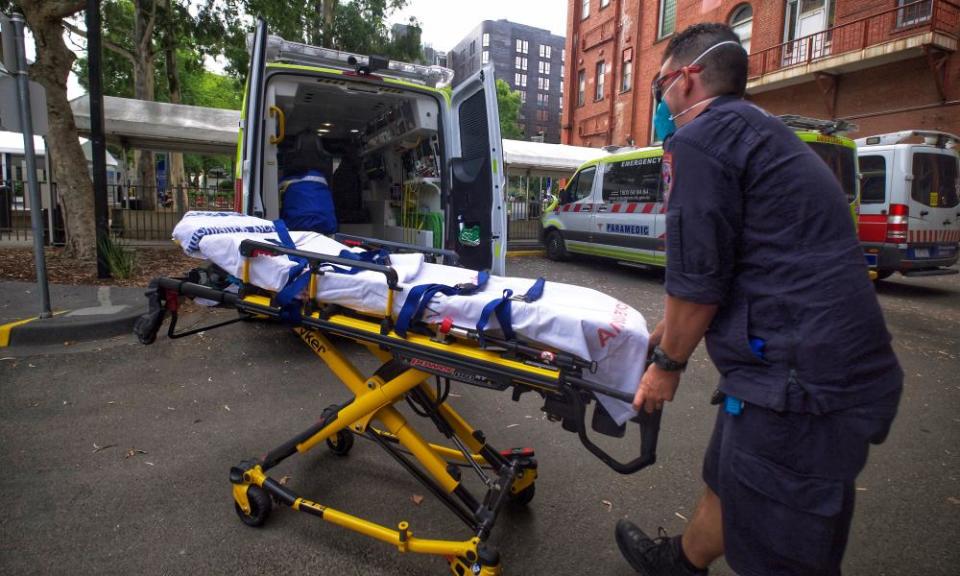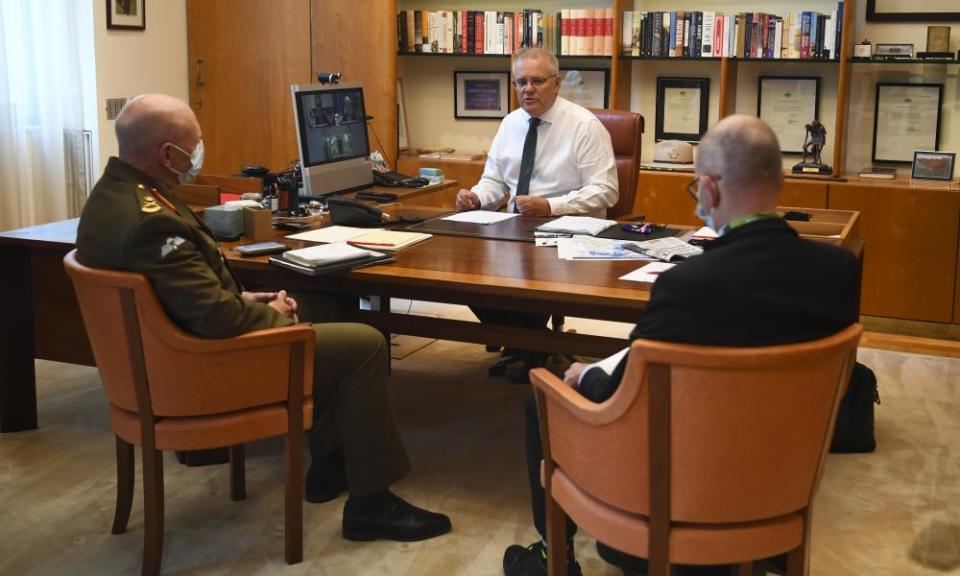On Australia’s deadliest day of Covid pandemic, experts say we don’t know enough about who is dying

Doctors say Australia must coordinate Covid-19 data nationally and pick up the game on testing, tracing, isolating and quarantining
Today is the deadliest day in Australia’s Covid pandemic. So far this year, about 30 Australians a day are dying with Covid.
“[These are] someone’s parents, grandparents, community leaders, people who contribute to our society,” the Burnet Institute director and chief executive officer, Prof Brendan Crabb, says.
And just because someone has “underlying conditions” doesn’t mean it’s less tragic. “Everyone is special,” he says.
Related: ‘Squandered any gains we made’: Australian GP clinics overwhelmed by rising Covid cases
Australia reported more than 75 deaths on Wednesday. In Queensland, 16 people died, New South Wales recorded 36 deaths and Victoria had 22 deaths. In the first 18 days of the year, more than 530 people have died – about a fifth of the 2,668 who have died throughout the entire pandemic. That’s despite the now dominant Omicron strain being less severe, despite Australia’s relatively low death rate, and despite claims the virus is peaking.
While the death rate is low compared to other countries, there will be a rise in both deaths and hospitalisations, the chief medical officer, Prof Paul Kelly, warned on Monday.
“(With) so many cases around, we are going to see a rise, and we’ve been very clear and distinct about that. I’ve spoken about that on many occasions. We will see, and have seen, a rise in deaths,” he said.
“We will see, and have seen, a rise in hospitalisations and intensive care.”
The federal health minister, Greg Hunt, the NSW premier, Dominic Perrottet, and the Victorian chief health officer, Prof Brett Sutton, are among those who believe Covid case numbers are peaking.
But hospitalisation and death rates lag two to three weeks behind case numbers, so Australia can expect more deaths in the future.
Experts say we don’t know enough about who is dying.
The University of South Australia professor of biostatistics and epidemiology, Adrian Esterman, says not only is Australia lacking a national data collection centre for Covid, we don’t even have nationally consistent definitions, which is “simply crazy”.
“It’s a total mish-mash and something should have been done about it,” he says, adding that a national data collection centre is needed.
“We do not have national data collection for Covid-19, full stop,” he says.
“We don’t even have an agreed definition of things for Covid-19, which is simply crazy. This is why we need a (national centre) in Australia.
“What is a case? Is it a PCR test only or a RAT, or both? Or someone who’s a probable case or a definite case?”
‘It’s jaw-dropping’
Esterman points out that the states and territories even use different timeframes to capture daily cases, with 24-hour periods starting and then finishing at different times.
“They can’t even agree on a date,” he says.
The federal health department publishes some age and sex information on deaths. States and territories publish some local government area data.
Most deaths are in people aged 70 years and over, although there have been deaths in every age bracket.
In most categories, more men are dying. But in the 90-plus bracket that switches to women.
The median age of death is 82 years.
Email: sign up for our daily morning briefing newsletter
App: download the free app and never miss the biggest stories, or get our weekend edition for a curated selection of the week's best stories
Social: follow us on YouTube, Facebook, Instagram, Twitter or TikTok
Podcast: listen to our daily episodes on Apple Podcasts, Spotify or search "Full Story" in your favourite app
All the available evidence suggests that the Omicron variant is not as deadly as Delta, but Australia is not doing enough testing to work out the actual breakdown. Meanwhile, people are still dying from Delta even as many more cases are Omicron.
The states and territories in some instances keep track of those who are unvaccinated, partially vaccinated, or fully vaccinated when they died, but there is no nationally consistent data. It is also not clear when or if a booster will be needed to be declared “fully vaccinated”.
Related: Rapid antigen tests: Australian consumers miss out as government and big business snap up supplies
Esterman says another difficulty with death data comes down to the doctor signing the death certificate.
“They need to know the cause of death, and often it’s not obvious,” he says.
“For example, if someone dies with a severe lung disease and had Covid-19, was it the Covid or was Covid incidental? Some people die from Covid, some die with it.”
It is well known that many conditions can increase the risk of being hospitalised or dying. Not being vaccinated creates the greatest risk.
A person’s age, whether they smoke, if they suffer from cancer, immunodeficiency, diabetes, severe obesity, heart or liver disease, if they are male, or if they are pregnant all add to risk.
People undergoing treatments including many cancer therapies such as chemotherapy or therapies that suppress the immune system also have a greater risk of dying.
Aboriginal and Torres Strait Islander people are at greater risk, as are people with disabilities.

Crabb says the use of the phrase “with underlying conditions” in press conferences is “unwise”. He says it may be that health authorities don’t want people to panic about the deaths but that “we have to be very careful about not saying there are two classes of Australians – the ones we care about and the ones we don’t”.
“It’s jaw-dropping … I would rather the people who died are recognised and celebrated in the same way other people are when they die in tragedies. It’s disturbing,” he says.
“A very large proportion of us do have an underlying condition – heart conditions, diabetes … even if that wasn’t the case, does it matter?
“Just because they had diabetes doesn’t make them any less special, and their death any less tragic.”
The prime minister, Scott Morrison, wants changes to how deaths “with” Covid are recorded.
“They went there for some other reason and that’s why they were admitted, and they’ve been tested when they’re there and they’ve been found to have Covid,” he said earlier this month.
“So we need to get a standard definition on that because these are the key things we have to track now.”
‘We have to get cases down’
There is also a lack of data about people’s vaccination status and the variant they caught.
Esterman says in Australia, we rarely know the vaccination status of those who die, or whether they have Delta or Omicron. State leaders sometimes mention the vaccination status of those who die, but there is not a consistent record.
“It would be possible to match up vaccination records with death certificates,” Esterman says.
“That should be possible (but) they’re struggling at the moment to even do simple statistics, so how will they do more complicated ones?
“I’m not saying it can’t be done, but nobody is doing it.”

Esterman says a national centre for data collection is needed. The Public Health Association of Australia and the Australian Medical Association have also called for an Australian centre for disease control and prevention, in a similar vein to the US Centers for Disease Control and Prevention.
Crabb agrees that we need a way to coordinate infectious disease data nationally “in a way that’s useful to the Australian public in real time and for future planning”.
“I think we get the second one (future planning) better than the first (real time),” he says.
As well as better tracking, Crabb is concerned that Australia has dropped the ball on testing, tracing, isolating and quarantining. Proper ventilation to prevent airborne transmission is also “grossly underdone”, he says.
While Morrison and others insist that case numbers no longer matter and we should focus on hospitalisation rates, Crabb says “cases do matter”.
“If we want to get deaths down, we have to get cases down,” he says. “Cases are where deaths come from.”
If you have a story you would like to share about someone you love dying from Covid, please get in touch on tory.shepherd@theguardian.com.

 Yahoo Sport
Yahoo Sport 





































